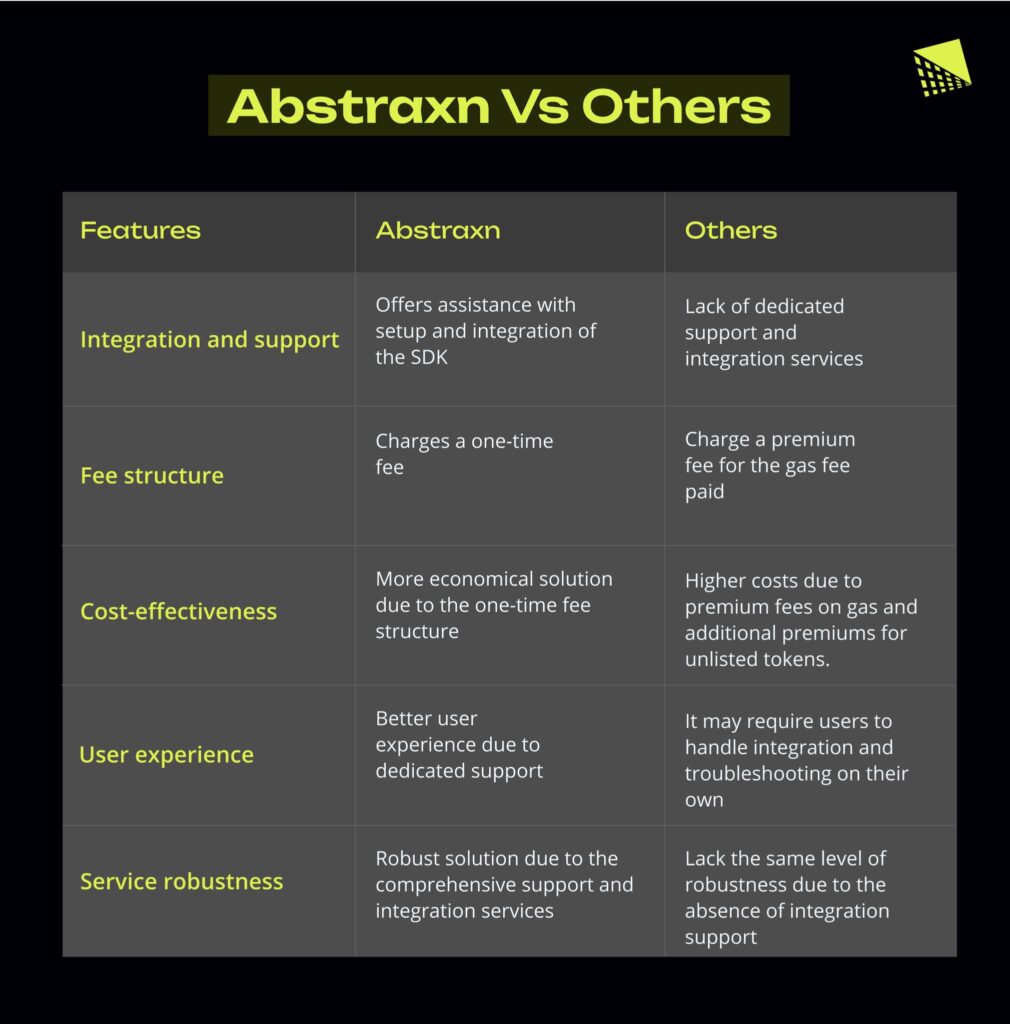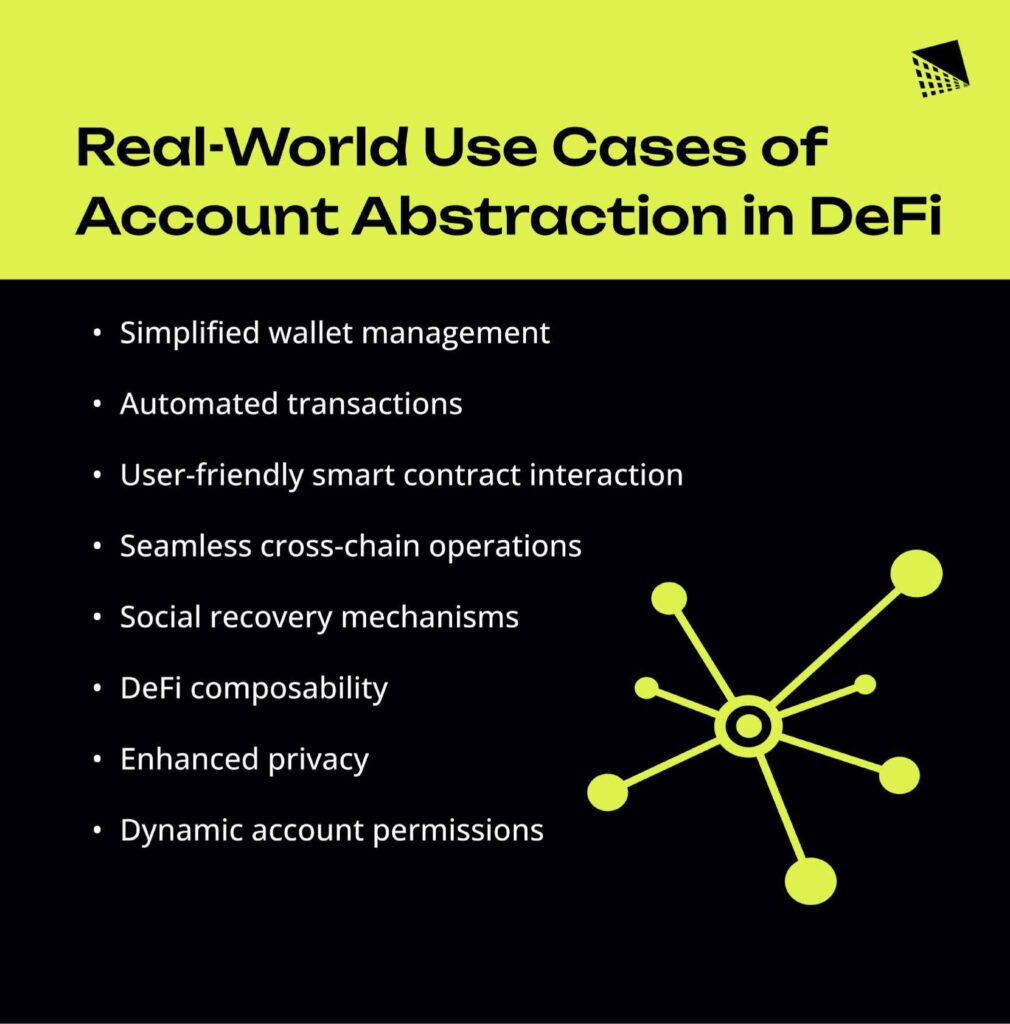The rise of decentralized applications (DApps) has revolutionized how we interact with digital platforms. DApps capture the value of blockchain technology that offers numerous benefits, including greater transparency, security, and decentralization. However, blockchain technology is beset with concerns like complexity and security that have often hindered widespread adoption.
Account abstraction is emerging as a solution to these concerns, enabling simplified user experiences and augmented security for DApps.
In this article, we will explore how account abstraction in Web3 enhances both security and user experience, making decentralized technologies more accessible and reliable.
Understanding Account Abstraction
Account abstraction refers to the process of decoupling the logic and control of user accounts from the underlying blockchain protocols. Traditionally, user accounts on blockchains like Ethereum are managed through externally owned accounts (EOAs) and smart contract accounts. EOAs are controlled by private keys that have to be managed and secured by users themselves. On the contrary, account abstraction allows for more flexible and user-friendly management of accounts, where the complexity of private keys and transaction signing can be abstracted away from the end user.
Read Also: Top Web3 Projects Utilizing Account Abstraction You Should Know About
Enhancing Security Through Account Abstraction
One of the primary concerns for users of DApps is security. The decentralized nature of blockchain means that once a transaction is executed, it cannot be reversed, and if private keys are lost or compromised, the user’s assets could be at risk. Account abstraction addresses several key security challenges:
- Reducing the Reliance on Private Keys
Private keys are the backbone of blockchain security, but they also represent a significant point of vulnerability. Users are required to securely store their private keys, as losing them means losing access to their accounts and assets. Account abstraction can mitigate this risk by allowing alternative authentication methods. For example, multi-signature wallets and two-factor authentication (2FA) can be integrated into the account management process. This reduces the reliance on a single private key and adds layers of security, making it harder for malicious actors to gain access.
- Customizable Security Policies
Account abstraction enables users to implement customizable security policies that suit their specific needs. For instance, users can set spending limits, require multiple approvals for high-value transactions, or define time-based restrictions. These policies can be applied through smart contracts, ensuring that even if an attacker gains control of an account, they are limited in what they can do. This level of customization enhances security by allowing users to tailor their account protections based on their risk tolerance and transaction behavior.
- Social Recovery Mechanisms
One of the most significant advancements of account abstraction is the concept of social recovery. In traditional blockchain setups, losing access to a private key can be catastrophic. With account abstraction, users can designate trusted contacts or devices that can help them recover their account in case the private keys are lost. This is achieved by implementing social recovery mechanisms, where a predefined group of trusted parties can collectively authorize account recovery. This approach adds a safety net for users, making it less likely for them to permanently lose access to their assets due to key loss.
- Enhanced Transaction Security
Account abstraction can also enhance transaction security by enabling transaction bundling and atomic operations. Transaction bundling allows multiple actions to be grouped into a single transaction, which is then executed as an all-or-nothing operation. This reduces the risk of partial failures and ensures that complex interactions between smart contracts are executed securely. Additionally, atomic operations mean that either all parts of a transaction are executed, or none are, preventing incomplete states that could be exploited by attackers.
Discover how Account Abstraction enhances security for users, simplifies complex transactions, and provides a seamless Web3 experience, ensuring both safety and usability for dApp interactions.
Improving User Experience with Account Abstraction
Apart from security, account abstraction significantly improves the user experience of interacting with DApps. The complexity of managing private keys and understanding blockchain transactions can be daunting for non-technical users. By abstracting these details away, account abstraction makes DApps more accessible and user-friendly.

- Simplified Onboarding Process
One of the barriers to entry for new users of DApps is the onboarding process. Traditional blockchain systems require users to generate and securely store a private key, which can be intimidating. With account abstraction, users can create accounts using familiar methods such as email and password, biometric authentication, or social media logins. This simplification reduces the friction of getting started with DApps and encourages broader adoption.
- User-Friendly Interfaces
Account abstraction allows the creation of more intuitive and user-friendly interfaces. Instead of requiring users to understand and manage complex blockchain interactions, the underlying mechanics can be hidden behind a seamless user interface. For example, users can interact with a DApp using familiar actions like clicking buttons or swiping, without needing to understand the intricacies of signing transactions or gas fees. This approach makes DApps more approachable for a wider audience.
- Seamless Transaction Experience
In traditional blockchain setups, users must manually approve each transaction by signing it with their private key. This process can be cumbersome, especially for frequent interactions. Account abstraction can streamline this by enabling automatic transaction approvals based on predefined rules. For instance, users can set up rules that allow small, recurring transactions to be automatically approved, mitigating the need for constant manual intervention. This creates a more seamless and convenient transaction experience.
- Improved Interoperability
Account abstraction enhances interoperability between different DApps and blockchain networks. By abstracting the account management layer, users can seamlessly switch between different applications without needing to manage multiple private keys or accounts. This interoperability allows for a more cohesive and integrated experience, where users can move assets and data across platforms effortlessly. It also promotes the development of cross-chain solutions, further expanding the potential of blockchain technology.
- Enhanced Privacy Controls
Account abstraction can enhance privacy by allowing users to control what information is shared and with whom. For example, users can create multiple accounts for different purposes, each with its privacy settings. This compartmentalization ensures that sensitive information is not unnecessarily exposed. Additionally, account abstraction can enable zero-knowledge proofs and other cryptographic techniques that allow users to prove their identity or ownership without revealing sensitive details.
Explore the powerful benefits of Account Abstraction in creating secure, user-friendly, and seamless Web3 experiences, ensuring every interaction is safe, efficient, and hassle-free.
Real-World Applications Of Account Abstraction
Several projects and platforms are already leveraging account abstraction to enhance security and user experience in DApps. Here are a few notable examples:
- Argent
Argent is a smart wallet that uses account abstraction to provide a user-friendly and secure experience. It allows users to recover their wallets through trusted contacts and integrates features like daily transfer limits and whitelisted addresses. By abstracting the complexities of private key management, Argent makes interacting with the Ethereum blockchain more accessible to everyday users.
- Gnosis Safe
Gnosis Safe is a multi-signature wallet that captures the value of account abstraction to offer customizable security policies. Users can require multiple signatures for transactions, set spending limits, and define other security parameters. This flexibility makes Gnosis Safe an ideal solution for individuals and organizations looking to enhance the security of their digital assets.
- Torus
Torus provides a seamless authentication solution for DApps by allowing users to log in with their Google, Facebook, or other social media accounts. By abstracting the account creation and management process, Torus simplifies the onboarding experience and reduces the friction for new users. This approach makes it easier for non-technical users to start using DApps without the need to understand blockchain intricacies.

The Future of Account Abstraction
As the blockchain ecosystem continues to evolve, account abstraction will play an increasingly critical role in driving adoption and enhancing security. Future developments in account abstraction are likely to focus on further improving user experience, enhancing interoperability, and integrating advanced security measures.
- Integration with Decentralized Identity Solutions
Decentralized identity (DID) solutions are gaining traction as a way to provide users with control over their digital identities. Account abstraction can integrate with DID frameworks to offer a seamless and secure identity management experience. This integration can further enhance privacy and reduce the risk of identity theft.
- AI and Machine Learning for Enhanced Security
Artificial intelligence (AI) and machine learning (ML) can be integrated with account abstraction to provide even more robust security measures. AI and ML algorithms can analyze user behavior patterns to detect anomalies and potential security threats in real-time. By leveraging these technologies, account abstraction can offer adaptive security measures that evolve with changing threat landscapes.
- Cross-Chain Interoperability
As the blockchain ecosystem becomes more diverse, cross-chain interoperability will be essential for seamless user experiences. Account abstraction can facilitate the movement of assets and data across different blockchain networks, promoting a more interconnected and integrated ecosystem. This interoperability will unlock new possibilities for decentralized finance (DeFi), supply chain management, and other blockchain applications.
Read Also: How Account Abstraction Can Drive Mass Adoption of Blockchain Technology
To Sum Up
Account abstraction represents a significant advancement in the evolution of blockchain technology, offering enhanced security and improved user experiences. By decoupling the complexities of private key management and transaction signing from the end user, account abstraction makes DApps more accessible to a broader audience. The customizable security policies, social recovery mechanisms, and seamless user interfaces enabled by account abstraction address key pain points that have hindered the mass adoption of decentralized technologies. As the blockchain ecosystem continues to grow and mature, account abstraction will play a pivotal role in shaping the future of secure and user-friendly DApps.






